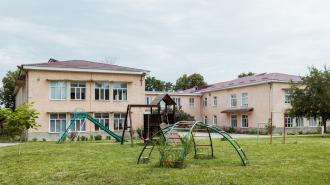From national strategy to local actions: Anenii Noi and climate change adaptation initiatives
August 16, 2024

It has been a year since the Republic of Moldova adopted the National Climate Change Adaptation Programme, a document through which authorities have aimed to enhance the climate resilience of six essential sectors: agriculture, health, transport, energy, water, and forestry sector. The Programme was developed with support of UNDP and the Green Climate Fund.
To align with the national vision, more and more cities and villages across the country are adopting local climate change adaptation plans. Ocnita, Bălți, Călărași, and Anenii Noi are just a few of the localities that have set the goal in recent years to mitigate the negative effects of global warming.
Authorities from the Anenii Noi city report that, over the past few years, they have implemented various measures to adapt to climate change. These include the installation of a LED street lighting system, known for its energy efficiency. Additionally, the buildings of the "Mihai Eminescu" high school in the area have been thermally insulated, and by the end of the year, the two kindergartens in the city will also be insulated.
Realizing that investments are needed to strengthen the community's capacity to face the challenges posed by climate change, the town's mayor, Alexandru Mațarin, has seriously considered drafting and adopting a Climate Change Adaptation Plan. In this process, the town's mayor was supported by experts from the UNDP Moldova project "Advancing Moldova’s national climate change adaptation planning process", funded by the Green Climate Fund, with the document being adopted in April of this year.

"Temperatures of nearly 40 degrees are a problem because they affect agricultural crops and the health of locals. We realize that without climate change adaptation measures, the situation will worsen year by year. We haven't been passive until now either; we've sought all kinds of solutions to launch initiatives that would help us cope with climate challenges. Moreover, we frequently organize reforestation actions of the areas around the city, actively involving the local community," says the town's mayor.
Alexandru Mațarin says that the initiative to include climate change adaptation among the locality's development priorities has been supported by the managers of educational institutions in Anenii Noi. Some did not hesitate to launch projects aimed at reducing the negative effects of climate change.
Victoria Borisov, the manager of the "Mihai Eminescu" high school, is proud of the thermal insulation of the institution's study buildings.

"Once this measure was adopted, we saved significant amounts of money, which we later invested in new study materials and equipment. We believe these actions not only help reduce energy consumption but also provide students with an example of environmental responsibility and the importance of taking care of our resources. Thus, we strive to instill in them a sense of responsibility and show them how they can also contribute to protecting the environment," notes Victoria Borisov.
The enthusiasm of the high school manager is also shared by Svetlana Zatic, who runs the "Andries" kindergarten in Anenii Noi. She believes that implementing ecological projects helps in teaching children to care for the environment.

"Environmental education starts from a very young age and at our kindergarten, we encourage children to observe, ask questions and learn how the world around them works. Thus, we aim not only to stimulate the children's curiosity but also to develop in them a sense of responsibility toward the environment," explains Svetlana Zatic.
In recent years, more and more villages and cities across the country are interested in having climate change adaptation plans. Why? Because such a document allows them, first and foremost, to attract energy efficiency projects. Additionally, it serves as a guarantee that future generations will have the opportunity to live in a healthier environment.
The Republic of Moldova is one of the most vulnerable countries in Europe to climate change, being especially prone to floods and droughts. To mitigate the negative effect of global warming, the government has adopted the National Climate Change Adaptation Programme until 2030 and the Action Plan for its implementation.

 Locations
Locations












